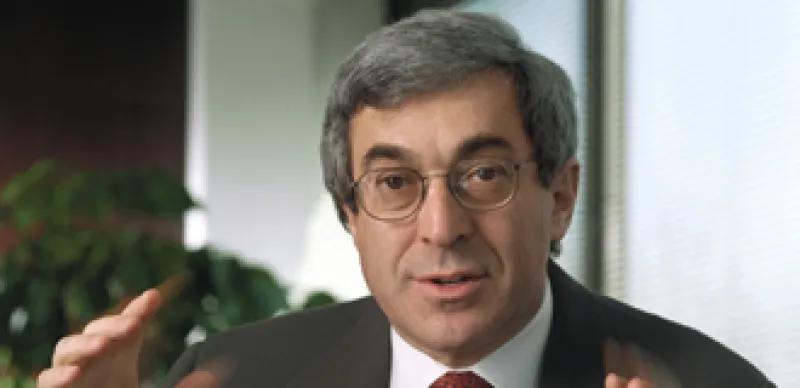Henry Schein CEO Stanley Bergman calls his company’s push to get doctors in private practice to adopt electronic medical recordkeeping, or EMR, “enlightened self-interest” — a happy combination of public good and private profit.
Certainly, the EMR drive by the U.S.’s largest distributor of dental, medical and animal health products and services constitutes shrewd timing: Not only does the Obama health care plan make EMR an explicit goal, but the American Recovery and Reinvestment Act of 2009 earmarks tens of billions of dollars for doctors and hospitals to buy software to automate patient records. This March, Henry Schein launched ConnectHealth to help its physician clients digitize their medical records.
So promising are Henry Schein’s prospects in EMR that it’s easy to overlook the company’s countless other activities. The nearly 80-year-old Melville, New York–based Henry Schein supplies 190,000 products, from needles and dental implants to tongue depressors and lasers, to 600,000 customers in 200 countries. Last year it reported record net sales of $6.5 billion, and the brisk pace continued in the first quarter of 2010: a whopping $1.8 billion in revenue, a gain of 18.5 percent over first-quarter 2009.
In a conversation with Institutional Investor Contributing Writer Katie Gilbert, the South African–born Bergman, 60, pokes and prods the Obama health care plan and gives his diagnosis for how to make its EMR provisions more robust.
Institutional Investor: What is Henry Schein doing to make wide use of EMR a reality?
Bergman: We have a strategic alliance with a company called Allscripts that has the largest installed base of practice management and electronic medical records for office-based physicians. Our goal is to work with Allscripts to go to as many American physicians and private practices as possible, helping them install electronic medical records software. About three years ago we did an in-depth analysis of the software market and concluded that Allscripts was the best partner for us, so we approached them. About a year ago we became the exclusive distributor for their main product. Allscripts has the best product out there, has the largest footprint and is well positioned to help automate the physician office.
Why is EMR so important?
On the one hand, the American public and the health care practitioner will be much better off with electronic medical records. It will mean fewer errors, more efficient practices and the ability to deliver higher quality health care. So it makes a lot of sense from a public policy point of view. On the other side, we can make money from this. Every system we sell has related to it electronic claims processing, credit card financing, patient financing opportunities. That’s why we see EMR as enlightened self-interest: It’s good for the American public, and it’s also good for Henry Schein, profitwise.
What does the Obama health care plan mean for you?
The Obama plan is about providing more access to care in the office setting — before the hospital. It provides a lot of funding for primary preventative care that really takes place in the physician’s office. And the doctor is our customer. So in broad strokes, we see more procedures ultimately taking place in an office setting and the “imbursement” not being increased significantly. What that means is that the imbursement per procedure will have to go down. So workers will have to run a more efficient office, most likely by utilizing technology, including practice management software and devices connected to that software. And those are all products that we do very well with. More patients are going to be given access to preventative care, which means fewer patients in the hospital and more-efficient, quality care. But we will need to help the practitioner run a more efficient practice. And we have a very good solution for the practitioner.
Might health care reform force you to lower some of your prices?
In the type of health care that we service, apart from flu vaccinations, the products are not reimbursed per product, but reimbursed per procedure. My guess is that customers will be looking for the best value in products, namely the lowest price for the best quality, and over time will probably migrate to our corporate-brand products. They are high quality but sold at a lower price. So there will be two major developments in the long run: One is the movement toward generic products, and the second is a movement toward practice management software and related equipment.
What’s the best part of the Obama health care plan?
The best part is that more of the American public will have access to preventative care. The challenging part right now is that the methodology for implementation is not clear. One area that really is very important is that guidelines be written for the government subsidy of software. The federal government has earmarked money to subsidize the purchase of software, but the regulations around that — the definition of “meaningful use” — are not clear yet. The sooner that happens, the better it will be for the cost as well as for the quality of health care in this country.
On a different topic, BP is being asked to pay for all the damages from the Gulf oil spill. Where do you as a CEO draw the line on corporate responsibility?
I can’t answer that from a Henry Schein perspective, but I’ll give you my personal point of view. Companies have a responsibility to society, even if things go wrong that aren’t their fault. If it’s attributable to them, they have an obligation to make society whole. Exactly how to do that, I don’t know, I’m not an expert in the field, but I would hope that the ecologies and the economies of the communities that are impacted will be brought back to where they were with the support of the private sector that caused the problem.
Henry Schein supports fairly extensive grassroots health care and economic initiatives in developing countries. Why does that make sense from a corporate perspective?
From the company’s point of view, we believe we have five constituents that make up the Henry Schein mosaic of success. We believe one of those constituents is the world around us. We are deeply committed to social responsibility, and we think the concept of enlightened self-interest — which Benjamin Franklin coined about 200 years ago — is most appropriate for a company. In the case of Henry Schein, we’re committed to access to care, both in this country and abroad. In that context we provide financial resources and supplies, together with our own suppliers, which service disadvantaged communities abroad and in the U.S.
You sold some $6 million of your shares in May. What do you say to an investor who finds that worrisome?
The bulk of my assets are in a family foundation. The foundation has professional managers, and they’ve been focused, ever since we became a public company 15 years ago, on making sure that there is diversity to the principal. So every couple of years, the trustees decide to liquidate some shares. I’m still a substantial shareholder at Schein — I think one of the larger ones — and I’ve got no intention of selling any more stock. And the trustees, to my understanding, have no intention of selling any more shares.
Henry Schein suffered a black eye last year when you ran short on flu vaccines. Will you be better prepared this year?
This year we’ve actually presold a good amount of the flu vaccine that we expect to receive. That’s No. 1. And No. 2, we’ve been told by our three manufacturers that they’re comfortable that they will be able to meet the FDA and other government regulations and produce the product in adequate quantities. So at this stage we have no reason to believe that we will not have an adequate supply for our customers.
How will South Africa — your native country — fare in the World Cup?
I don’t know the answer, but let me ask our CFO, who’s usually much better at predicting the future. [Bergman asks Steven Paladino, Henry Schein’s CFO, who’s in the room with him.] He says Argentina. But hopefully South Africa will make it to the finals. [It didn’t.]
What has made Henry Schein successful over the years?
It’s our people. That’s the most important thing. We don’t need to worry about the strategies; we don’t need to worry about the markets. If we keep the atmosphere in place, the business will continue to grow. It’s about culture. What makes a good leader at Schein? It’s someone who would know how to run a good summer camp and can get everyone to play. That’s our philosophy at Schein, and it’s worked for a long, long time.






